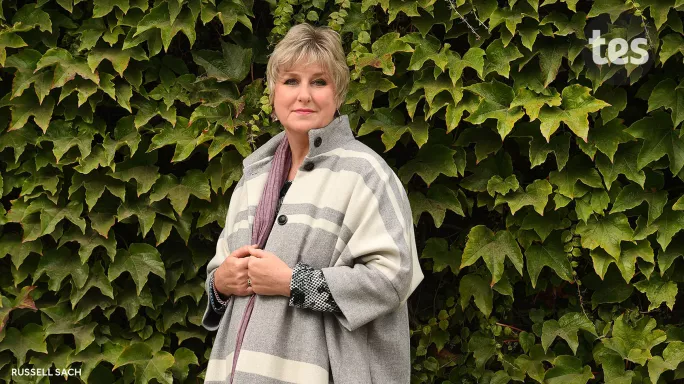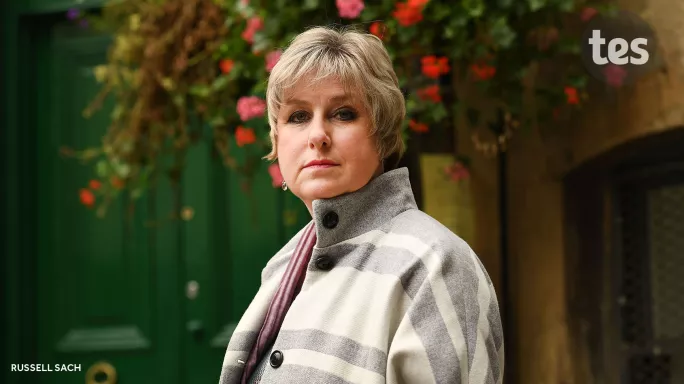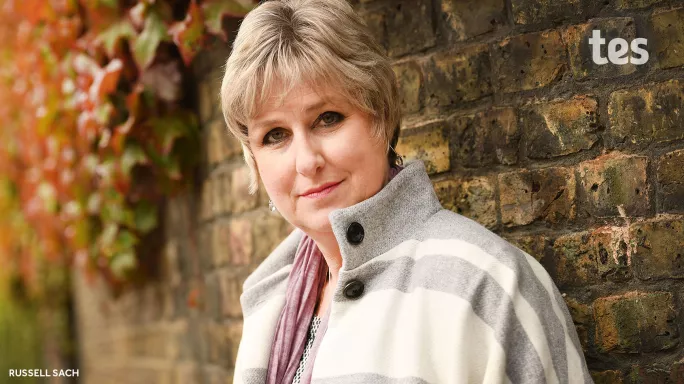- Home
- Meet NCG’s new chief executive, Liz Bromley
Meet NCG’s new chief executive, Liz Bromley

It has only been a few weeks since Liz Bromley took up her post as chief executive of one of the UK’s biggest college groups, but she is certainly well aware of the scale of the challenge she has taken on.
NCG - which encompasses seven colleges, two training providers in the process of being wound up and 2,500 staff across a total of 61 locations - has not been without its struggles over the past few years. Criticised from the start for lacking the geographic focus of other college groups by being spread across England, the group was given a “requires improvement” grade by Ofsted in 2018 following what was the biggest multi-site inspection in the watchdog’s history.
And in March of this year, it was announced that NCG would be closing down its two training providers, Intraining and Rathbone Training, which employed 425 people and made a £3.6 million loss in 2017-18.
Read more: NCG college group appoints new chief executive
More news: NCG rated ‘requires improvement’ by Ofsted
Background: 300 jobs at risk as 19 training centres set to close
Ambitious to be ‘outstanding’
In her first interview since being appointed, Bromley outlines the first of her three priorities for the organisation as being “the quality agenda”.
“We have to get back from being ‘requires improvement’ to being ‘good’, and once we are ‘good’ we want to be ambitious for ‘outstanding’. So that is threading through everything we do and every decision we take.
“Second, we have to be financially sustainable and we must be able to reinvest in fairly short order in our learning environment, our facilities and in our staff so that our staff feel valued. Third, I think my priority is around the culture we need to develop and maintain. A culture of ‘why not?’ and a culture of ‘can do’ has to permeate through NCG in order that we can take and make opportunities. That cultural change to strive for excellence, to be ambitious and to work together for a far greater good is my third key priority.”

The job of winding down the training providers, which began before Bromley took up her post, will be concluded this year, she explains. “We will have moved all of our students over to other programmes - where appropriate - by Christmas, and the financial ramifications of the wind up will have washed through in this current financial year. Which means that this is a year for planning, for looking ahead, and for determining how the strategy will be realised in 2020. I am focused very strongly on the future, and our financial forecasting post-training provider wind-up is actually very robust.”
‘Pockets of excellence’
To improve that all-important Ofsted judgement, a quality improvement plan has been rolled out across the colleges - supported by government funding - to improve teaching. “We have pockets of absolute excellence in different areas and the sharing of that practice right across the group is well on the way,” Bromley explains.
“We have had an interim visit from Ofsted which recognised that we have made really good progress. We have an executive director of quality who takes the strategic lead on the quality strategy, but we have seven very committed college principals who are delivering the curriculum on the front line who are using their experience and the experience of their teaching staff to ensure that quality agenda is put into practice.”
“Because of the efforts we are putting into the quality work and looking at the value for money we deliver through the professional services across our group, I am very confident that when we set our budget for 2020-21, we will be in a very solid financial position.”

Bromley grew up in Cheshire, and was a trailblazer from the start, being in the first year of girls to attend the local boys’ grammar school, and the first in her family to attend university. She attended the University of Oxford where she studied English and English literature, and was part of the second year of women attending the previously all-male Worcester College. Although it’s fair to say that Bromley’s experience was atypical: she didn’t attend a single lecture in her first year.
“I had no idea what lectures were, so when I say I read English, I really did. I sat in my room and did all the reading because I didn’t know the lectures were there to supplement. I didn’t attend lectures until second year,” she explains. “I am very keen for any young person from any background who enters any form of education to really understand what they signed up for and to feel enabled to actually get the benefit from it.”
Following her time at Oxford, she joined Arthur Andersen as a trainee chartered accountant. But she freely admits that her English studies meant she “could not have been less well equipped for a career in accountancy”. She adds: “I was lucky because I met my first husband who was an accountant and who was on a secondment to the Middle East, so instead of completing my qualification, I got married and moved to the Middle East. I am relieved to say I never became an accountant.”
After a number of years living in Bahrain and Muscat, Bromley returned to the UK, now with three young daughters, to work for the BBC in local radio as a local programme producer. “I used to edit Farming Today and get it down from an hour and 20 to 62 minutes or whatever,” she recalls. “And it is just one of those random things in life that I can do that there is absolutely no requirement for in this digital age.”
Enabling learners
In the mid-nineties, and now with four children, Bromley joined Milton Keynes College in what was her first role in education. “That was my start, but I really enjoyed the environment in the college and I had such a good time engaging with the FE world. I then got the opportunity to join the Open University, which to be perfectly honest was only half a step away from the world of FE, because it is so much about widening accessibility, participation, enabling those for whom education at any level seems possibly unattainable.”

She remained at the Open University for 10 years, eventually running the social work programme, and becoming the OU’s first non-academic associate dean, responsible for teaching quality and students. From there she became executive director of student life at the University of Salford. Five years later, Bromley was appointed registrar secretary COO of Goldsmiths, University of London, before progressing to the role of deputy vice-chancellor of the University of Central Lancashire, responsible for corporate services and international.
So what attracted her to the role at NCG? “I am now at a point in my career and in my life where I don’t really have anything to prove and I was looking for a job I really wanted,” Bromley says. “The NCG role really brought together all of my professional experience in terms of management and leadership and getting stuff done, but all within that wonderful environment of a learning organisation and a complex infrastructure of colleges working autonomously and yet together. The NCG brief was just hugely exciting.”
‘A warm induction process’
Her first weeks in post have been a “very welcoming and warm induction process” meeting staff and students at NCG’s sites across England. “I have spent time at all seven colleges within the group so I have a sense of the commonality that there is, but also the really important differences. What happens in Kidderminster is fit for Kidderminster and responds to the needs of the people around, and what happens in West Lancashire in Skelmersdale again is fit for the purposes of that community - very different from the colleges of Lewisham and Southwark.
“The challenge and the opportunity I have in my role is to bring the very best practice and experience out of every college in order that any college that is part of the NCG group is able to excel because it has such a broad knowledge base.”
Working in a college setting, rather than a university, is not as different an experience as some might expect, she says. “Obviously a lot of students, especially here in Newcastle where we have the sixth-form college, are younger, but actually it feels like a learning environment where a lot of young people have arrived for the first time, with high hopes and a degree of nervousness, creating friendship groups, doing lots of stuff outside the classroom. But actually they are here to potentially shape the rest of their lives.”
NCG is currently working on its strategy for the next decade, and Bromley explains one of the important building blocks of that was to engage staff, management and leaders with the construction of that strategic plan.
“We have been able to distill all that collaborative work into a very clear mission and a very clear vision for NCG. The principals have agreed there is only one mission and one vision for NCG and that the strategic themes are all highly applicable to their individual colleges.” Within that, however, she stresses every college has to be free to have the operationalisation of the strategic plan fit their regional purpose. “That is where the culture will come through because we are all striving for the same thing.”
Unique opportunities
Staff development will be another focus going forward, she stresses - and one where NCG can offer unique opportunities. “Just imagine if a member of staff wants to develop their personal career and their learning and can take a six-months secondment to a very different college. They get to see a very different environment, meet different people, a different group of students, and they can bring that learning back to their substantive role. That is an opportunity that because of our diversity, we can offer.”
Some challenges remain, however, Bromley acknowledges. “The challenge is: what is the point? You can see if you have a college group that is clustered in a particular area that there is clear strength in that sort of consortium, being neighbourly with each other and having hold of the market. So there is real challenge in that what is the point in NCG?”
“I would answer that by saying the point is we are different and we are able to have national influence because we have that diversity of interest in five different locations, rather than just the North East, or just the North West, or just London.”
She says she is working hard to ensure the principals of the seven colleges work together, and each of them is going to take on a strategic portfolio across the group. “I think that by working together and having communities of excellent practice, by having portfolio responsibility, we will be able to draw bridges between these very diverse communities and have real opportunities.”
What Bromley comes back to, whether it is when she talks about her career in the university sector or her vision for NCG, is the experience of students.
“I want to be absolutely clear that NCG students have absolutely the same kinds of life and learning opportunities as those who go to university. And with our teaching degree awarding powers I certainly think we have every opportunity to make the NCG learning experience really dynamic, really purposeful, and to get great outcomes for our learners.”
Keep reading for just £1 per month
You've reached your limit of free articles this month. Subscribe for £1 per month for three months and get:
- Unlimited access to all Tes magazine content
- Exclusive subscriber-only stories
- Award-winning email newsletters



